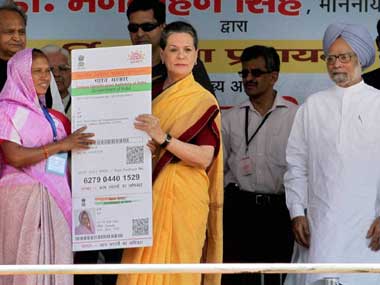Since Tuesday’s press conference where Finance Minister P Chidambaram and Rural Development Minister Jairam Ramesh called the UPA’s cash transfer scheme a ‘game changer’ and let loose the Congress’ seeming political anthem for 2014 - aapka paisa aapke haath, those following the last mile issues have been stunned at the speed with which the government is promising this roll out.
Chidambaram had said in the press conference that 29 schemes are ready to start on January 1 in 51 districts across 16 states. And the entire cash transfer is based on Aadhaar or the Unique Identification Number. The entire country, he said, would be covered by next year.
This was Firstpost’s evaluation of the claims:
#1: It will give the benefits directly to only the intended beneficiaries. Bogus claimants will be automatically eliminated. (Probably)
[caption id=“attachment_539473” align=“alignleft” width=“380”]  PTI[/caption]
#2: It will drastically reduce corruption and middlemen and touts. (Doubtful)
#3: It will improve systemic efficiencies. (Sure)
#4: It will help reduce the subsidy bill because of the elimination of the above wastages. (Unlikely in the short run)
In that piece R Jagannathan had also argued that there are competing financial inclusion models at work. Experts too agree that on the field the reality is very different. It costs more to get the money to widely distributed villages than the cash transfer.
And today, Business Standard in a graph on its front page presents how weak the actual penetration of Aadhaar is in India. Get this: 80% of India is not covered. Maharashtra and Andhra Pradesh are the only states with some coverage at 35% and 57%, respectively. Bihar, Uttar Pradesh, Madhya Pradesh, Tamil Nadu are woefully low at 2%, 5%, 18% and 10%.
And Andhra and Maharashtra are politically significant states for the Congress. When asked about its political implications, Chidambaram said, “It is an absurd argument. I cannot find a stronger word…”
It might be sir, but this roll-out plan sounds a little on the absurd side too.


)
)
)
)
)
)
)
)
)



